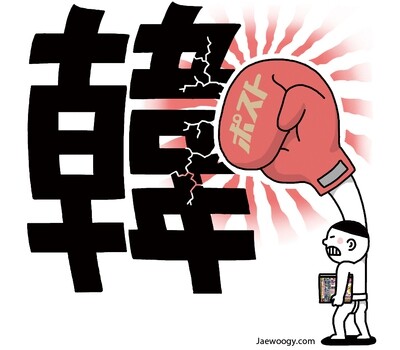hankyoreh
Links to other country sites 다른 나라 사이트 링크
[Column] The rise of anti-Korean media in Japan

The name of Japanese publisher Shogakukan is well known among South Koreans – manga fans in particular. During the 20th century, it launched Japanese manga into a golden age, releasing popular works like “Touch” and “Detective Conan” through Weekly Shonen Sunday. It’s considered one of the “big three” such publishers, alongside Shueisha and Kodansha.
Launched in 1922 as a publisher of educational magazines for elementary students, the company published children’s magazines for militarist educational purposes during the imperial era. After Japan’s World War II defeat, it branched out into general publications, scoring a major hit in 1969 with the publication of “Doraemon” in an educational magazine. But despite its image as the company that included fairly strong anti-war messages in “Doraemon” and selected the work of Jeon Won-son – a Zainichi Korean singer active in Japan and South and North Korea – for its nonfiction prize in 2006, other magazines that it publishes, like the monthly “Sapio,” are seen as right-leaning.
The recently published “Shukan Post” ended up at the center of a firestorm after publishing a special edition titled “We Don’t Need Korea!” Alongside provocative messages such as “we don’t hate Korea, we just want to cut ties,” and “goodbye, annoying neighbor,” it coarsely claimed, “Koreans have a disease: they can’t keep their anger in check.” It also predicted that the “[South Korean] boycott of the Tokyo Olympics will increase the Japanese medal count to double digits.” It has drawn an outcry from writers over its “hate speech.” Some authors who announced that they would no longer be serializing essays in the message, with one philosopher promising not to “do anything more for Shogakukan.” Yu Mi-ri, a Zainichi Korean writer, denounced the “hate speech fanning racism and hatred.” “Did they not stop to imagine how it might feel for Korean and Chosen children living in Japan to see these ads, or Japanese citizens with roots on the Korean Peninsula?” she asked.
A survey estimated that Japanese people posting right-wing messages represent 1% of all internet users (according to the introduction to the Korean-language edition of Eiji Oguma’s “Democracy and Patriotism”). The problem is that those people are offering a market to allow struggling publishers to break even. Anti-Korean content in particular has undergone a sharp and visible rise ever since the Asahi Shimbun acknowledged misreporting in a 2014 article about the eyewitness account of Seiji Yoshida, who claimed that the forced drafting of comfort women to serve as sexual slaves to the Japanese military had taken place on Jeju Island.
In response to the torrent of criticism, the Shukan Post published a position statement. But as an apology it was vague, with a strong sense of stressing how “other views also exist.” In a Sept. 3 appearance on one Japanese network, journalist Osamu Aoki, author of the books “The True Nature of the Japan Conference” and “Three Generations of Abe,” said, “At a time when magazines aren’t selling, they’re latching on to the notion that special editions that appeal to the exclusionary ‘online right’ will at least sell copies – and there’s also an increasing mood with the television networks that Korean bashing will always find an audience.” His remarks really seem to show the current state of anti-Korean reporting in Japan.
By Kim Young-hee, editorial writer
Please direct comments or questions to [english@hani.co.kr]

Editorial・opinion
![[Guest essay] Amending the Constitution is Yoon’s key to leaving office in public’s good graces [Guest essay] Amending the Constitution is Yoon’s key to leaving office in public’s good graces](https://flexible.img.hani.co.kr/flexible/normal/500/300/imgdb/original/2024/0416/8917132552387962.jpg) [Guest essay] Amending the Constitution is Yoon’s key to leaving office in public’s good graces
[Guest essay] Amending the Constitution is Yoon’s key to leaving office in public’s good graces![[Editorial] 10 years on, lessons of Sewol tragedy must never be forgotten [Editorial] 10 years on, lessons of Sewol tragedy must never be forgotten](https://flexible.img.hani.co.kr/flexible/normal/500/300/imgdb/original/2024/0416/8317132536568958.jpg) [Editorial] 10 years on, lessons of Sewol tragedy must never be forgotten
[Editorial] 10 years on, lessons of Sewol tragedy must never be forgotten- [Column] A death blow to Korea’s prosecutor politics
- [Correspondent’s column] The US and the end of Japanese pacifism
- [Guest essay] How Korea turned its trainee doctors into monsters
- [Guest essay] As someone who helped forge Seoul-Moscow ties, their status today troubles me
- [Editorial] Koreans sent a loud and clear message to Yoon
- [Column] In Korea’s midterm elections, it’s time for accountability
- [Guest essay] At only 26, I’ve seen 4 wars in my home of Gaza
- [Column] Syngman Rhee’s bloody legacy in Jeju
Most viewed articles
- 1[Guest essay] Amending the Constitution is Yoon’s key to leaving office in public’s good graces
- 2Faith in the power of memory: Why these teens carry yellow ribbons for Sewol
- 3[Guest essay] How Korea turned its trainee doctors into monsters
- 4[Editorial] 10 years on, lessons of Sewol tragedy must never be forgotten
- 5K-pop a major contributor to boom in physical album sales worldwide, says IFPI analyst
- 6How Samsung’s promises of cutting-edge tech won US semiconductor grants on par with TSMC
- 7Korea ranks among 10 countries going backward on coal power, report shows
- 8Final search of Sewol hull complete, with 5 victims still missing
- 9[Column] A death blow to Korea’s prosecutor politics
- 10Exchange rate, oil prices, inflation: Can Korea overcome an economic triple whammy?